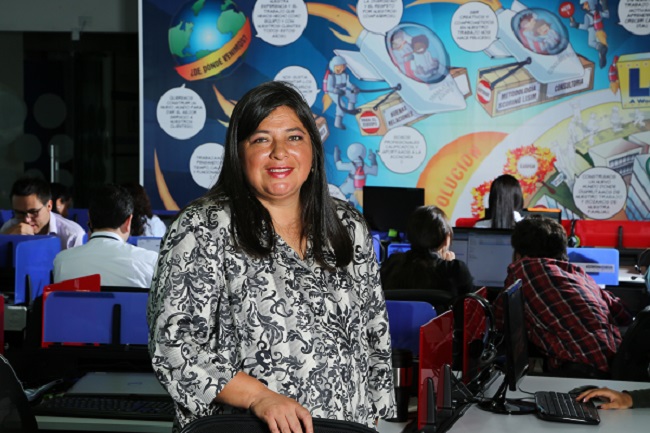
- Founder and President, Grupo LiSim (Consulting)
“A company’s innovation culture must stem from a disposition across the organization to spot new opportunities.”
Summary
Lilian Simbaqueba, founder and president of LiSim, narrates her journey founding one of Colombia’s pioneering credit risk consultancies which served the microfinance industry in 1996. She explains how her time in Germany studying IT engineering was a major inspiration for her later entrepreneurial undertakings. As she recalls in the interview: “I had a chance to work for a multinational company that built risk forecast models for credit evaluation—particularly for credit cards. There [in Germany], banks and credit institutions rely on those evaluations. My experience started there, prompting me to dream about returning to my homeland and building my own firm” around those principles.
This unique skillset indeed played to her advantage. In the interview, Simbaqueba explains how she was one of the few people in the Colombian financial services industry familiar with a new practice called scoring, and how she leveraged this knowledge to found her own business and quickly build a client base. She also discusses some of the strategies she used to adapt both the scoring system and her business model to fit the Colombian setting.
In 1998, just a few years after the founding of LiSim, Colombia experienced a severe economic crisis. Simbaqueba describes how, seemingly overnight, “many institutions that were doing fine suddenly [started] collapsing.” LiSim lost many important clients, and the future looked uncertain. However, as Simbaqueba explains, the crisis also forced LiSim to grow and innovate in order to survive—and it ultimately proved fundamental in shaping the group’s identity. Indeed, it was at this point that LiSim ventured into micro-finance: “Had it not been for the crisis, we wouldn’t have been so eager to try to pursue other projects… we ventured into other segments and began helping out in utilities, telecoms… [so ultimately] the crisis contributed significantly to our growth.”
Simbaqueba goes on to discuss how the microfinance model played into the group’s early efforts at international expansion—first regionally in Mexico, and later in South Asia, the Middle East, and Eastern Europe—and she explains how the group adapted its micro-finance model to address regional and cultural barriers. She also shares her thoughts on innovation, product focus, and some of the factors that motivated the group’s decision in 2008 to work with Endeavor, an organization designed to support and enhance high-impact entrepreneurs across the developing world. Simbaqueba talks at length about some of the operational and strategic changes implemented at LiSim as a result of this decision, and some of the challenges that were associated with this new partnership, including taking the difficult decision to sell shares in LiSim.
Simbaqueba concludes the interview by sharing her experience as a women in business, her efforts to mentor fellow female entrepreneurs, her thoughts on training and recruiting a skilled workforce, and how she has worked over the years to create and maintain a corporate culture that is both demanding and empowering.
Video Clips by Topic
Gender
Additional Resources
- Lilian Simbaqueba, "LA FÓRMULA PARA EL EQUILIBRIO,” TedxBogotaMujeres, November 2017.
- Elmira Bayrasli, "Predicting the Path Out of Poverty: Microfinance & Credit Risk Analysis," Forbes, September 19, 2011.
- "Historia de una voluntad," Portafolio, March 24, 2006.
Interview Citation Format
Interview with Lilian Simbaqueba, interviewed by Andrea Lluch, Bogota, Colombia, November 7, 2017, Creating Emerging Markets Oral History Collection, Baker Library Historical Collections, Harvard Business School.
